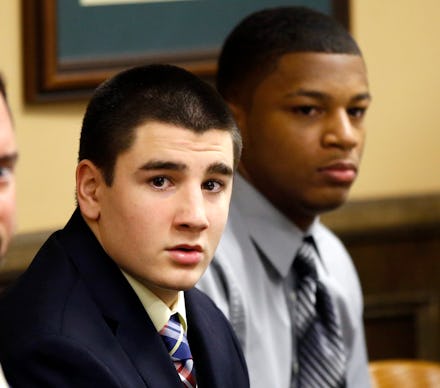The Maryville Rape is Steubenville 2.0

Just six months after the collective outrage of a nation forced the district attorney in Steubenville, Ohio to prosecute two under-aged rapists, a new small town rape is making headlines. In Maryville, Mo. an under-aged intoxicated girl was raped by a popular and powerful football player. Yet, 20 months after the assault, no one has been prosecuted, the young woman's family has been run out of town, and their house was burned to the ground. This begs the question: has Steubenville changed anything?
Early in January 2012, 14-year-old freshman cheerleader Daisy Coleman (whose name was released by her mother) and her 13-year-old friend snuck out of her house and into the basement of 17-year-old Matthew Barnett. At Barnett's house, Daisy was given multiple cups of liquor that she was encouraged to consume. The 14-year-old was then raped by Barnett while his friend recorded the assault on his iPhone. In another room, Daisy's 13-year-old friend was also raped by a 15-year-old. After the assault, Daisy was too intoxicated to walk so the older boys carried her to the car and left her on her front lawn in 30 degree weather. When Daisy's mother found her the next morning, her hair was frozen.
Within 12 hours of the assault, the local police department had all of the suspects in custody, obtained audio and video confessions, and executed warrants to find the boys' homes. The swift actions of the police all but assured that the case would be prosecuted. Trust in the system kept Daisy's family going through the harassment that followed Daisy's allegations.
Maryville's response to the allegations was alarmingly similar to the backlash in Steubenville. In both cases, the towns came to the defense of their football stars. Children and adults alike turned against Daisy and shunned her for her allegations. Her family members were threatened with violence and Melinda Coleman, Daisy's mother, was inexplicably fired from her job. Two months after the attack, all of the charges against Barnett were dropped due to "insufficient evidence." The Colemans made the decision to leave Maryville, and in April 2013 their home was burned down.
As the national media picks up Daisy's story and the public once again discusses the pandemic levels of rape in America, all conversations will be tinged with Steubenville. The bullying and harassment will be compared to that suffered by Rehtaeh Parsons and Lizzy Seeberg. People may compare the failure to prosecute in Maryville to the rampant unpunished rapes in the military and on college campuses. The United States has seen so many high-profile sexual assaults in recent years that it is impossible to know exactly what national conversation will come out of another American rape.
This country is on the brink of growing cold and callous against the horrible stories that continually repeat themselves. But there is still time to write the legacy of Steubenville. Americans have the opportunity to insist that the justice found in Ohio is found across the country. It is not too late to protect young women and demand more from young men. Rape is not inevitable and Daisy Coleman deserves justice.